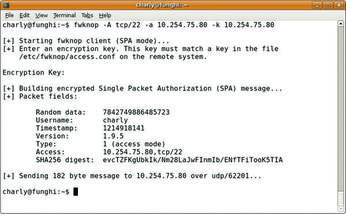KEY EXPERIENCE
The sys admin's daily grind: Single-packet authentication
ByConventional, woodpecker-style port knocking is open to sniffing and brute force knocking attacks. Sending an encrypted packet with an access request to the server is safer and more modern. Learn more about Firewall Knock Operator, a.k.a. Fwknop.
Conventional port knocking, which I described last month, protects you against attackers who routinely scan whole networks looking for "low-hanging fruit." A cracker who takes more time and logs communications can also identify knocking signals because the sequences will repeat.
In theory, you might consider using lists of one-off knocking signals that become obsolete after use. Unfortunately, this is really complex. Besides, if the administrator is not creative enough, an attacker could just try out popular knocking sequences (port 7000, 8000, 9000, ?) to gain access.

Single-Packet Authentication (SPA) is one possible solution. The knocking system sends a single packet containing the encrypted authentication credentials – typically a pass phrase – and the client request to open a specific port. An SPA implementation that works really well is Firewall Knock Operator, or Fwknop [2]. Besides the normal build tools, the installation requires Perl, the libpcap-dev package, and the CPAN Net::Pcap module. After installing all of these resources, installing Fwknop is a breeze thanks to the Perl-based installer.
Matching Knobs
Fwknop comprises the fwknopd server and the fwknop client. By editing two files below /etc/fwknop/, you can configure the server; fwknop.conf contains the basic configuration. Initially, you will just need to change a couple of parameters, which are tagged __CHANGEME__.
The other knobs you could tweak here have very sensible defaults. Note that you need to synchronize the time between the server and the client because if the difference is too big, fwknopd will ignore the knocking client.
The entries in /etc/fwknop/access.conf define how fwknopd responds to a client knocking. The secret key that the client uses to identify itself is stored here. The SOURCE line can be used to restrict the networks from which the daemon accepts knocking. To set the port that the system opens on successful knocking – for example, tcp/22 for SSH – you can use OPEN_PORTS. Figure 1 shows a successful attempt. The fwknop client picks up the key from its own /etc/fwknop/access.conf.
If the SSH connection doesn't open quickly enough, the FW_ACCESS_TIMEOUT on the server triggers. This time is normally set to 30 seconds, but I went for twice that – never rush an admin on the job!
INFO
[1] "Knock-Knock" by Charly Kühnast, Linux Magazine, September 2008,
[2] Fwknop: http://www.cipherdyne.org/fwknop
Charly Kühnast is a Unix operating system administrator at the Data Center in Moers, Germany. His tasks include firewall and DMZ security and availability. He divides his leisure time into hot, wet, and eastern sectors, where he enjoys cooking, fresh water aquariums, and learning Japanese, respectively.
Subscribe to our Linux Newsletters
Find Linux and Open Source Jobs
Subscribe to our ADMIN Newsletters
Support Our Work
Linux Magazine content is made possible with support from readers like you. Please consider contributing when you’ve found an article to be beneficial.

News
-
Fedora 43 Has Finally Landed
The Fedora Linux developers have announced their latest release, Fedora 43.
-
KDE Unleashes Plasma 6.5
The Plasma 6.5 desktop environment is now available with new features, improvements, and the usual bug fixes.
-
Xubuntu Site Possibly Hacked
It appears that the Xubuntu site was hacked and briefly served up a malicious ZIP file from its download page.
-
LMDE 7 Now Available
Linux Mint Debian Edition, version 7, has been officially released and is based on upstream Debian.
-
Linux Kernel 6.16 Reaches EOL
Linux kernel 6.16 has reached its end of life, which means you'll need to upgrade to the next stable release, Linux kernel 6.17.
-
Amazon Ditches Android for a Linux-Based OS
Amazon has migrated from Android to the Linux-based Vega OS for its Fire TV.
-
Cairo Dock 3.6 Now Available for More Compositors
If you're a fan of third-party desktop docks, then the latest release of Cairo Dock with Wayland support is for you.
-
System76 Unleashes Pop!_OS 24.04 Beta
System76's first beta of Pop!_OS 24.04 is an impressive feat.
-
Linux Kernel 6.17 is Available
Linus Torvalds has announced that the latest kernel has been released with plenty of core improvements and even more hardware support.
-
Kali Linux 2025.3 Released with New Hacking Tools
If you're a Kali Linux fan, you'll be glad to know that the third release of this famous pen-testing distribution is now available with updates for key components.
